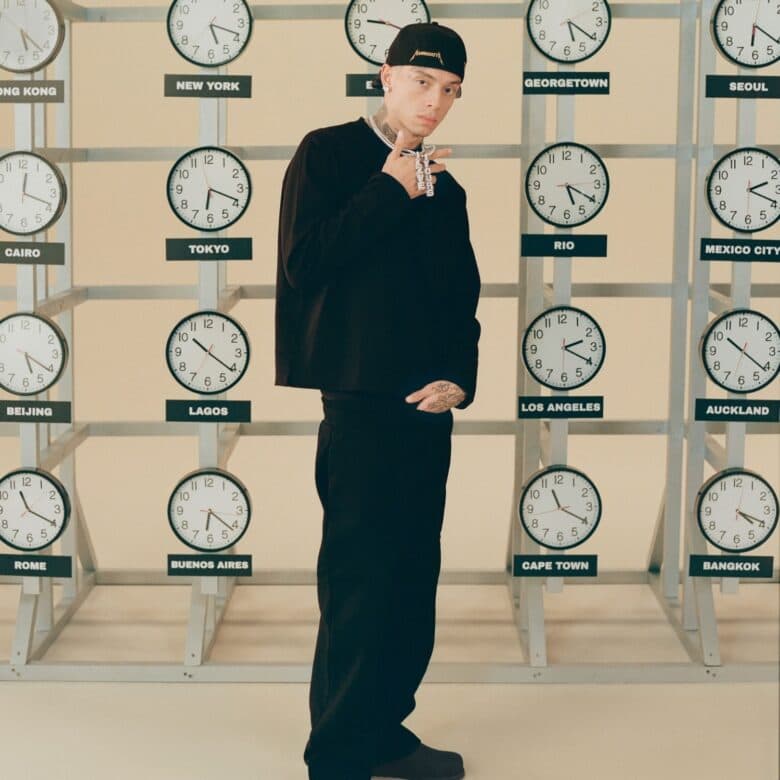Greta Isaac is putting her guts on a plate with ‘Productive Pain’

When Greta Isaac arrives at the café, she’s spent the morning enjoying the first of the spring sun. The music artist and former FIZZ member is, too, warm in demeanour — she compliments my eye colour, we chat about our three-year-old cats (hers she found behind a billboard as a kitten) and one of the baristas comes and gives her a hug. It transpires that he’s one of the “amazing, gorgeous, talented friends” who Isaac recorded her recent EP, Productive Pain, with at Middle Farm, South Devon, over the course of a couple of days. “It was very quick — very intensive,” Isaac recalls, “But it didn’t leave any room for overthinking or trying to shape [the EP] into something that it didn’t want to be.”

The recording process makes sense for a project so raw in nature. Stemming from a chord progression recorded on a voice memo six years ago, which the artist “forgot about completely”, Productive Pain eventually came to be after Isaac stumbled upon it, this time round finally having “the words to apply”. “Years went on,” she explains, “and I had something to write about. And suddenly I remembered [the voice note], and it felt, kind of, cosmic and like the universe sort of interrupted a little bit.” That serendipity can be felt through the truthfulness of the four-song record — the first project Isaac wrote solo for almost a decade. “ It was interesting to be in dialogue with myself,” she says. “Not looking to the left or right of me for what was good — I don’t think anyone else could have written these songs because of how honest they are about my life, you know?”
Over two glasses of matcha, the artist talks me through the moments, both cosmic and earthly, that led to her most “guts on a plate” project to date.
Growing up in Wales, you came from a pretty musical family, right?
Yeah, I grew up in a very musically-enriching family. I’m one of five siblings and so music was always something that we did to bond — we all sang together a lot and both my parents are really talented musicians, so I was very lucky that that was just a part of discussion from really young. Family friends who were singers and musicians would always come in and out of the house, so it was like a big family — not by blood necessarily, but the house was always alive with music. Music was always a form of expression and connection with people.

And what did the start of your own musical journey look like?
Singing was the main thing. And then, when I was about fifteen, I started learning how to play the guitar. My brother had started learning and he was really good at it, and I was like, I want to be as good as that. But being able to actually write songs myself came when I first heard Laura Marling and Ellie Goulding and stuff — these young women who were, kind of, armed with their guitar, writing their own songs about love and heartbreak and, you know, feeling out of place in the world maybe. I was really drawn to that.
That authenticity can really be felt in Productive Pain — the lyrics tap into something so honest.
Yeah, totally. What was nice about writing this was, typically, you would write a song in a six-hour session or something. And with these songs, it was nice to come back to them over many months. Especially if it’s something as, like, guts on a plate as this, I want to feel like I’ve understood the whole spectrum of the concept of the song before putting the lyrics in. So dipping in and out depending on how I was processing something and giving myself the space to let that breathe before immortalising it in a song was really helpful.

Can you give me a little overview of the songs on the record?
Well, the whole EP is about processing something — the different stages you go through when you come to know yourself through a transformative or difficult time. The first song, “Stuck On The Ceiling”, is, not a breakdown, but a descent into something that demands attention. It’s about ruminating, obsessive thinking and feeling anxious — second guessing a lot of interactions that I’ve had or the way my thinking works. Feeling out of control and detached from your body. Feeling separate.
Then “I’m sad and I’m angry and I’m scared that you hate me” is an extension of that — when you feel like you’re trying to problem-solve, and you’re digging through the toolbox of your mind a little bit. You keep asking these questions, but often enough all the information that you might need about a situation is in your emotional experience of it.
Then we go into “Way Too Much”, which someone described as, like, the moment in a therapy session where you start sobbing and I thought, that was exactly how it felt to write that song. I was grappling with a lot of feelings that I had about myself, about being, I guess, too much and not enough. I was categorising the things about myself I felt were too intense and should be put away in a box because they were bad, but in hindsight, in doing that I was storing away a lot of the things about myself that I really value, like creativity and being empathetic and excited and passionate about life. So now I’m at a point where I’m trying to let that box open and allow for all of those things to exist communally — to not be afraid of parts of myself.
Then “Productive Pain” is, kind of, the conclusion at the end of it all. If the other three songs are asking a lot of questions — trying to decipher the meaning of life and who I am and my relationships — this one doesn’t ask any questions. It’s about sitting in discomfort. And I think it’s that tension where you grow as a person. There’s space for all of it.

In a way, “Productive Pain” feels like an anti-conclusion.
Oh my God, that’s exactly it! This pursuit for truth is so ingrained in so many of us, and sometimes the most powerful thing you can do is shrug your shoulders and say, I don’t know, and I don’t have to know. With any sort of grief or loss or heartbreak — because they all illuminate something in you that doesn’t exist outside of really intense relationships, you know? — there’s an interesting mirror that happens that’s very revealing, and you’ve got to look at it. The only way out is through, and you’ve got to let yourself feel every ounce of it because that’s what’s special about life — being able to experience the full spectrum, however painful it can be.
Would you say you’re a naturally very introspective person?
Yeah, definitely. Maybe too much. I’m definitely very thinky. Very, very, very thinky. I’ll usually direct the lighthouse at my own responsibilities and mind. And sometimes it gets paralysing, but in a way it’s cool. It’s a blessing and a curse to feel and think this much. But I’ve learned to love it.
Do you feel like there’s an overall message you want to communicate as an artist, then?
Any message that I would direct out is probably something I’m still working on myself — something that I feel like I need. Like a mantra I need or a North Star that I need. And that would probably be that it’s okay to feel deeply, and not to store that away as an inherently difficult thing. You’re not difficult, you’re not unmanageable, you’re not too much. You’re just enough.

- WriterScarlett Coughlan
- Image CreditsKarina Barberis




